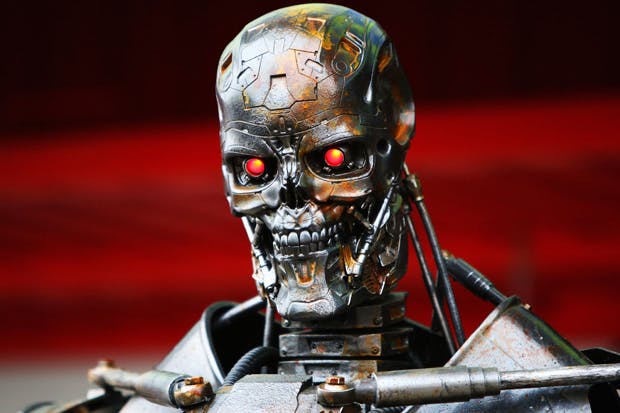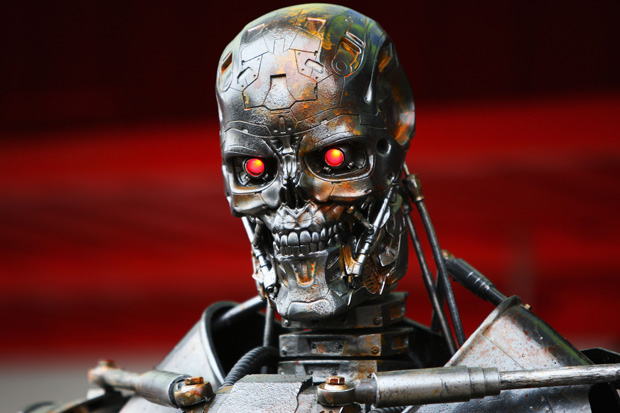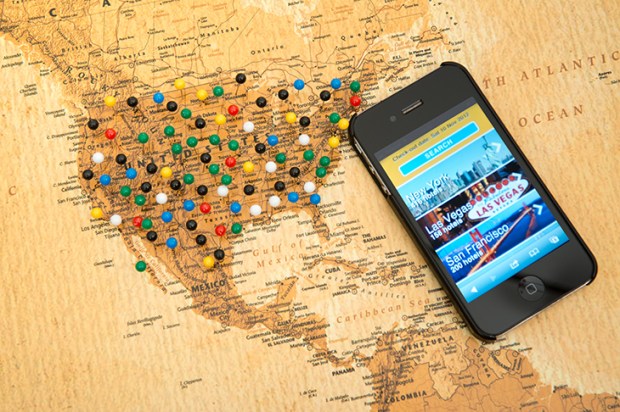One evening last autumn, four experts in the field of artificial intelligence arrived in Westminster with an urgent message for our government. There’s a robot revolution on the way, they said, and unless we prepare for it we’re in trouble.
The briefing was a quiet affair — I was one of only a few journalists invited, for fear of headlines like ‘The Terminator is coming’. However, by the time the last A.I. expert had said his piece, it was hard to imagine how a hack could over-hype the story. Computers really are set to take over, it turns out. We’re rolling unstoppably towards servitude to machines.
The four experts spoke in turn, each about a different point in the future, like biblical prophets warning of the End Times. The most farseeing prophet was theoretically the most alarming. He talked about ‘the singularity’, the point at which a computer will be capable of recursive self-improvement; of designing and building machines cleverer than itself and far, far cleverer than us. He said this point might be only 45 years away.
How do we ensure these brilliant robots don’t turn against us? How do we program them to respect puny, human life? No one knows, said the prophet. No one’s come up with a way of teaching a computer human values, so should we let A.I. continue with no fail-safe? This is something for you to start considering (here he eyed the Westminster thinkers) right now, before it’s all too late.
I peered about in the hope of catching policy wonks scribbling memos such as: ‘Must action plan to prevent robot world domination.’ Both the wonk to my left and the right were playing on Twitter. It’s a fair bet that, come the robot revolution, our brightest minds will be too busy tweeting to notice.
The next seer had a less apocalyptic vision, but it was perhaps more frightening for being so immediate and inevitable. Within the next five years or so, he said, swaths of the jobs we take for granted will be done by robots — certainly the blue-collar ones: cleaning, washing up, driving vans, sorting post. He smiled. He was a very jolly prophet. I see it as a liberation, he said, a freeing of the toiling masses from manual labour. I saw it then, and still see it now, as a potential catastrophe.
To grasp the scale of the problem and how very imminent it is, look at America. It is a continent defined and created by roads. In more than half of all US states, the top job, the one done by more people than any other, is truck-driving. There are 3.5 million truck drivers and a further 5.2 million employed in the trucking industry. Just think of all those men crisscrossing the country; rumbling from Savannah, Georgia to Sacramento, CA, sprinkling dollars like fish food along the way, in cafés, gas stations, motels. Whole towns depend on the appetites of truckers.
Now consider the fact that Daimler has just unveiled its first self-driving truck. The 18-wheel Inspiration has, on the quiet, been cruising the interstate highways with great success. It’s road-approved and, once purchased, needs no more than petrol money. Each human driver costs $40,000 a year.
The expert told us that many thousands of lives would be saved by robot trucks. He said 90 per cent of fatal accidents involving trucks were because of human error. I’m afraid this fills me with more gloom. Safer trucks mean lower insurance. Haulage companies stand to save billions, meaning mass redundancies are a done deal. I remember driving on Route 66 a decade or so ago, ogling the ghost towns that the interstate had bypassed in ’73. Pretty soon, more ghost towns will be created.
Hard on the heels of truckers will be waitresses and burger-flippers. A smart-alec company called Momentum Machines has announced that its robot can make a perfect hamburger — all toppings sliced, placed and cooked in less than half the time it takes a human. A burger every ten seconds — and no need to pay a machine, or let it smoke, pee or sleep.
‘The device isn’t meant to make employees more efficient, it’s meant to completely obviate them,’ says Momentum Machines. The nasty irony for America’s minimum wage earners, who’ve been striking recently for higher pay, is that the more they cost, the quicker they’ll be replaced by droids.
Bionic butlers, nannies, bionic legs, smart hearts, compliant robot sex dolls, robot nurses are already on the market. The revolution is here. Yes, technology is wonderful, it’s given us longer, happier lives. But what happens when the jobs begin to go? What will fill the yawning gap left by gainful employment?
The standard A.I. answer is that governments of the future will have to pay a ‘living wage’. Benefits such as pensions will have to be de-linked from earnings. Money for nothing and your beers for free. What of the self-worth work brings? What about what to do all day? Since that night last year, I’ve heard more than one A.I. expert suggest that most blue-collar workers will be thrilled at the chance to explore their creativity. There will be a surge in demand for handmade crafts, say some, as if several million former truckers have been waiting their whole lives for the chance to make rag rugs.
I’d like to say that, faced with this upheaval, a ripple of urgency went through our policy-makers. I’d like to tell you there was much talk afterwards about how the Tories’ great ‘make work pay’ programme was going to cope in this brave new world, about what students might do as starter jobs. I’d like to imagine that, since that night, a group of movers and shakers meet regularly to plan for the automated age — this was surely the reason the A.I. gurus had come. But I very much doubt it.
What I suspect the audience thought, if they paused for thought between tweets, is, ‘Thank God for that. Policy-making couldn’t possibly done by A.I.’
I wouldn’t be so sure of that. Imagine a robot with access to the entire internet; to the costs and findings of every policy ever enacted worldwide. Wonks, you’ll be first against the wall. Time to prepare.
Got something to add? Join the discussion and comment below.
Get 10 issues for just $10
Subscribe to The Spectator Australia today for the next 10 magazine issues, plus full online access, for just $10.















Comments
Don't miss out
Join the conversation with other Spectator Australia readers. Subscribe to leave a comment.
SUBSCRIBEAlready a subscriber? Log in